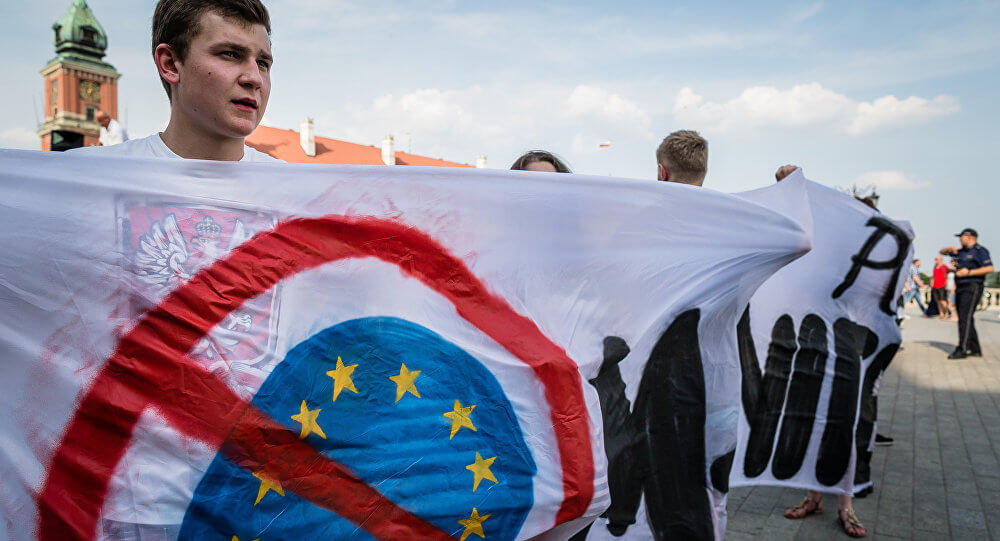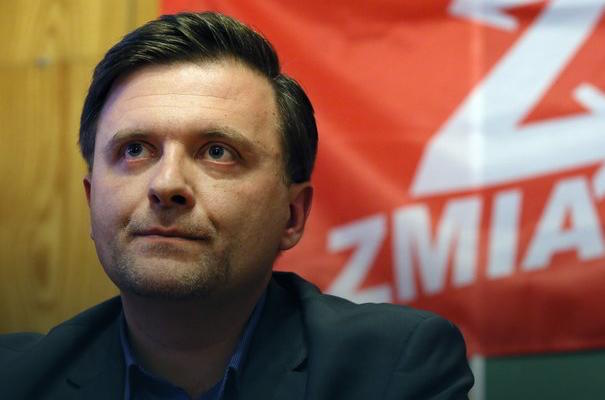By Bruno Drweski
After the Nazi occupation, Poland was completely destroyed and managed to be reconstructed very quickly and become at the end of the sixties the tenth industrial economy in the world1. This put mass of Poles in a situation where they could begin to dream they can access quickly to the Western type consumer’s society. And during the seventies, the new Polish leadership under Edward Gierek « opened » the Polish economy to the West, giving then to his compatriots a decade of « almost » consumer style Western society, but introducing with it a new individualistic morality and the « debt economy » that put Poland in hard economical crisis at the end of this decade, when it appeared this country was forced to pay growing unexpected debt interests. This lead to the massive working class protest of 1980 which culminated with the creation of the Solidarnosc Trade Union officially engaged at that time for a reformed and self-managed socialism …at the very moment when the « communist » Party hierarchy had sent to North American universities their « best » economists. One of them being Leszek Balcerowicz, the future post-1989 « shock therapy » ideologue, at that time « Senior teacher » at the Party Central Committee Marxism-leninism Basic Issues Institute. He was sent to USA where he was trained in …reaganomics. Simultaneously, well known intellectual advisers of the Solidarnosc Trade Union, like Bronislaw Geremek2 or Adam Michnik, were also taken in charge by Western institutions and received regularly for their activities funds from pro-US Western Trade Unions, NGOs and organisations like the NED or USaid, so they became less and less socialist and more and more neoliberal.
At the time when Solidarnosc was legal (september 1980 – december 1981) its direction made a lot of provocations and miscalculated decisions so the enthousiasm that prevailed in september 1980 was gradually lost what explains the rather successfully introduced martial law in december 1981 and the then relative popularity of the leading « People’s Poland » aristocratic General Wojciech Jaruzelski. At the beginning of 1981, Solidarnosc had almost 10 millions members …but when it was banned, quite few workers did strike to save it and two years later, when the regime created a new Trade Union, the OPZZ, 7 millions out of 12 millions salaried people did join it. When Solidarnosc was relegalised in 1989, it could not even recuperate 2 millions of its former 10 millions members, the majority of salaried remaining then, 5 millions of them, in the « communist » but bureaucratised OPZZ Trade union. Since that time both opportunistically lead trade unions lost the majority of their former members.
The bases for regime change
Because of the inconsistency of its government policies and because of the sanctions imposed against Poland by Western powers, Poland did not really get out of the crisis during the eighties and this explains why, at the end of this decade, in the context of Gorbachov’s Perestroïka, what was left from the Polish opposition after the defeat of Solidarnosc in its confrontation with the government in 1981, concluded the « Round Table » agreement with the de facto already then neo-liberal leading fraction of the « communist » Polish United Worker’s Party. An agreement refused by the Left within Solidarnosc movement (among others the Polish Socialist Party – Democratic Revolution) and criticized by the « communist » OPZZ Trade union. This agreement was in fact concluded because in 1987, the Polish government failed to win by itself the referendum it organised to introduce already some kinds of liberal reforms. Then, in spite of strong neoliberal trends within both establishments, both sides agreed in 1989 to promote reforms that were officially supposed to bring a more socially oriented economy and democratised institutions within socialism. Even if then Rakowski government formed in 1988 already allowed the creation of private enterprises which were immediately massively created by a lot of State enterprise directors and managers who began to play simultaneously as private businessmen and as state ones. One private businessman signing juicy contracts with himself for his private enterprise as a State director. This explains why the leading forces within the « communist» party did not need any more this party as tool for their career, since they managed already to become owners of production or trade tools.
But we must still notice that the 1989 agreement did not put ahead the issue of capitalism because the country elites knew it would still then not be accepted by the people. But, as soon as the June 1989 elections were over, giving very ambiguous results, first of all since there was no competition of programs but only of candidates within very rigid frames, the new coalition government decided suddenly to introduce capitalism, proclaiming in the summer 1989 the « shock therapy » that surprised most of the Poles who felt more and more betrayed by both sides, the « communist » Party and the Solidarnosc leadership which obtained the support from the Catholic Church, the Soviet leadership and Western powers.
The shock and awe chaos therapy
Balcerowicz under official power of Jaruzelski, Mazowiecki and later Walesa began then to introduce the shock therapy planned by his American advisers. This policy was presented as the one that would finally bring Poland toward the Western capitalist «consumer paradise» style of life after a supposedly very short period of sacrifices. Premier Mazowiecki pledged in August 1989 in front of the parliament that there will be an economical restructuration giving birth to a very provisional unemployment that will not exceed six month. There was already at the top of institutions, since the Rakowski’s government reforms of 1988, a rich class of former « socialist managers » that could be then quickly rejoined by some well introduced in Western leading circles «dissidents». Medias were in the same time very quickly taken over by Western oriented interests.
As the second « liberal democratic » premier of Poland Jan Krzystof Bielecki stated frankly in one of his interview when asked about the non very legal way some people get tremendously quickly rich in an Ocean of growing poverty : « The first million has to be stolen3 » so later everybody will profit of this not very legal enrichment. Balcerowicz on his side asked by a journalist of Sztandar Mlodych what the government will do if the society protest against its massive impoverishment : «We are introducing reforms so quickly that there will be no more possibility to make a way back when the people will understand what happened». …This policy was then called in the Western medias «democratic reforms»!
In fact, most of the Poles did not have time then to care any more about politics as they did earlier, because they had to fight for their every day’s survival, competing to find some salaried work or trying to create their own enterprise and spending in that purpose the savings they massively had accumulated from the socialist period. Most of those newly built enterprises went bankrupt after one or two years of existence. Sufficient time for the « market reforms » and the «democratization of medias» being irreversible. According to a Polish neoliberal economist who emigrated to USA, Kazimierz Poznanski, he calculated that the efficient then and privatized Polish enterprises were then sold in a hurry for about 10 to15% of their real value4. Part of them were closed immediately after having been bought so to destroy the competing capacities of the Polish economy and most of the remaining ones turned to assembly shop for big transnational corporations, mostly German. Polish know-how and self-sufficiency that was real in quite a lot of fields got partly lost when it could not be used for the benefits of big transnational corporations. Polish know-how in informatics for example, was turned in services for those global corporations. The rather nationalist and conservative economist Witold Kiezun, who used to work for Burundi under a UN programme, compared what happened to Poland after 1989 to the African type of neocolonialism he experienced there5. Out of 1.615 enterprises built at the time of socialism, 657 were closed after 1989, and only less than a quarter of them were closed for a more or less rational reason such as environmental problems, outdated technologies or immediate non efficiency6.
What was lacking then in Poland was not critics coming from some relatively open minded and non dogmatical liberals or nationalists, it was the very badly needed deep scientific, leftist and counterbalanced analysis of the very fast transformation process introduced in Poland under the law of globalized capitalism. Still existing Polish leftists after 1989 were not prepared to understand what the real capitalism was in fact, at the end of the eighties. Some of them thought capitalism was still the keynesian, social-democratical, «Swedish type» one, while others thought that since there is not a lot of Polish capitals, a strong capitalism in Poland will be impossible to introduce so socialism will automatically survive and be reformed. They failed to understand globalisation and imperialist logics which lead Western capitalists to consider Poland as a peripherical and well situated useful neighbouring country that could be treated as a new economical colony under a « soft power » like and supposedly democratical government. This lead to the disintegration of leftist tendencies in both existing then political and trade union structures, the « post-communist » one and the « post-dissident » one. What was helped by the money arriving from Western « NGOs » aimed to «organise» Polish « civil society » activities with the goal to disintegrate every critical trend, promoting individual « young leaders » and leaving alone the broad masses which were disintegrated by unemployment, emigration, short term contracts and outsourcing.
Voting with his feet against the real success story
In a situation of massive unemployment and labour degradation, it is estimated that between 3 to 4 millions Poles emigrated (voted with their feet) to Western countries between 1990 and 2016. In spite of that, the official unemployment rates stayed all the time very high, it is now still around 10%, not taking into account imposed part-time labour and people who do not register at unemployment offices since most of the unemployed in Poland do not receive any benefits.
In spite of those facts, « macro-economically » speaking, Poland is a pure « success story » since. From 1992 up till now it is one of the few countries in Europe with a regular economic growth, what was recorded especially since all EU countries entered in deep crisis that reached even the once celebrated « good pupils » like Ireland, Spain, and Hungary. But this «macro» situation does not change at all the « mass » reality of the growing gap existing between « two Polands », the one that works hard (Poland has the highest level of working hours of OECD country after South Korea7) and get regular salaries, mostly Warsaw, the main cities of the Western part of the country, and the second Poland that has to fight for survival, the Eastern and North-Eastern part of the country, suburbs, the little towns, poor countrysides. For those « frustrated Poles » as they are called by the rich upstarted newcomers, the only institution that help them and show them some forms at least of respect, even if patriarchal, is the Catholic Church.
Because Polish success in fact is not a Polish one, since it is mainly due to the fact that Polish workers and very well trained engineers are working for foreign, mostly German, companies. Because they are less paid than their Western colleagues for the same work and because they live not far from Germany, especially near the new German capital of Berlin that lays 60 km from the Polish border. Poland has then become a « working reservation » for Western capital. What Hitler tended to do the tough way by himself, new Germans are doing in a slightly more smooth way, with up till now at least, north American approval. National sovereignty became then a pure slogan at the moment when more than 85% of the Polish banks are in foreign hands, most surviving Polish enterprises are belonging or linked with Western transnationals, 70% of the foreign trade has been reoriented toward EU countries and the economic balance of the country is more and more largely due to money inputs coming from Polish emigrants in Western countries. Before being integrated to the EU market, Polish capitalism had to be « secured » by NATO. Now US Army extra-territorial facilities should be installed in Poland in the near future. Poland could be the military field training of the USA in case of nuclear war with Russia or any other Shanghaï Cooperation Organisation country.
Discontent and lack of perspectives
This situation explains why Poles are now completely disoriented and more or less half of them ceased to vote after 1989. Former communists feel they have been betrayed by the Party nomenclature leadership, and former Solidarnosc militants feel they have been betrayed by former leading dissidents. Both of them feel then they were naive, a feeling that does not give any chance to be proud and smug, and then to be ready to fight again for collective ideals. The new young generation does not believe in any of the former values carried on by their parents and a lot of them are then tempted by a radical nationalist « revival » which seems rather incantational and sometimes racist and violent but does not result of a scientific analysis of the imperialist economical system Poland needs to bypass. Polish national dignity is submitted to constant frustrations what explains why successive governments try to feed this national(ist) frustration with « enemy images » concentrated only against the « good legal enemies », the communists which do not exist anymore in most cases, the Russians that freely evacuated Poland after the international agreement signed with unified Germany about Polish western borders, Muslim migrants who do not want to come to the Polish land of unemployment, « terrorists » who could target a country that spent its own citizen’s money to take part in the « liberation » of Afghanistan, Iraq, etc., and accepted CIA secret prisons where prisoners were tortured.
For the last 25 years, there were two mainstream competing political discourses in Poland that managed to conquer almost all medias. Both are rightwing, conservative and antiprogressive. All leading (and rich) political parties, including former legal heirs of the « communists », celebrate « freedom », « democracy », « market values », « America », « Europe », « NATO » but in a slightly different way. When the liberals (including the Union of Democratic Left created by the « liberal » wing of the former « communist » party) celebrated market reforms, NATO, Iraq War, EU, privatization, open borders, etc. that created a class of privileged new comprador bourgeoisie linked with transnational interests, the other side of the same mirror, the more traditionalistically and nationalistically oriented former Solidarnosc leaders who accepted first most of these counter-revolutionary reforms, say they would have preferred the reforms have been at least partly reserved only for « true Poles ». They support the opinion that the « Reds » in power in 1989 plotted with dissidents with « Red roots » to take over in common the economy of the country and privatize it to their only interest, leaving the rest of the nation aside. An argumentation which is not completely false, except the fact that these « Reds » were not reds at all and did not have nothing to do any more with communism or socialism8. Like the liberals, these nationalists hate the spectrum of communism, they hate Russia and they need the protection of USA. Hidden in a large part of the Polish « soul » Russian imported Homo sovieticus is supposed according to them to be the only real responsible for any tragedy happening in Poland from 1989. But, contrary to the liberals, « national-catholics » do not like either Germany, intellectuals, and even to a certain extent EU they would like to see, at least in theory, rebuilt in a confederacy of « free » nations. The liberals favor a society opened to moral relativism, individualism, sexual freedoms when the traditionalists favor a catholic oriented more authoritarian and collective society with strict moral values and, consequently, some social values taking into account the situation of the poors.
After 25 years of predominantly liberal governments (with the exception of two nationalist governments), now the tide has turned, and Poland is under the government of the Law and Justice (PiS) party representing the « national-catholic » until now largely marginalised part of the society, even if the Catholic Church establishment managed to influence all Polish governments at least from the seventies. Left wing movements are then very weak in Poland, even if opinion surveys show that a lot of Poles, up to half of the population, still maintain some different kind of nostalgy for socialism and are in favor of State economical interventionism in a secularized society. But each time a really socialist movement did appear after 1989, it was immediately destroyed or marginalized most often from inside by opportunist leaders tending to find their place within the liberal establishment or competing with other leftist leaders. Some people consider as true the conspiracy theory that the Polish State secret police formed by US advisers and some former « communist » state security specialists is destroying through provocations and agents all attempts to create a really massive leftist organisation.
Conquering the deep State
In a situation where almost half of the population does not vote, the PiS party succeeded to convince quite a large mass of Poles that it will restore some form of national sovereignty, launch a Polish re-industrialisation programme, defend Polish economical interests and some kinds of social aids for the marginalized and create an « Intermarium » block of State from Estonia up to the Balkans so to negotiate with Brussels better for Eastern « partners » economical policies. PiS programme is a mixture of petit-bourgeois « identity » rightist values and « social » leftist imaginary. Strongly antimarxist and antirussian. In a country that is traditionally suspicious about Russia, but also about Germany and Ukraine.
Since the PiS government has been elected in 2015, relations with Russia are equally bad as earlier, or even worst, but they deteriorated then with Germany and EU, basically because the new Polish government wants to marginalise in the administration and justice apparatus pro-liberals appointed during the last 25 years, at the same time it tries to promote a « Polish re-industrialisation » programme in fact opposed to the EU « open borders » dogmas and takes some very limited in fact but still socially oriented measures toward the poors and marginalised. Counting on the approval of the USA for strategical reasons …what did not really happened since Washington administration and Soros foundation criticized the PiS government for its human rights violations. In fact, for promoting some local economical interests contradictory to the global ones.
Human rights coming from the West are mostly pure hypocrisy since the liberals criticize nomination of new judges in the constitutional court but do not oppose the concrete repressions of militants fighting against expulsion of poor tenants unable to pay the new rents decided by pre-war « reprivatised » house owners, the recently decided imprisonment of four members of the Communist Party of Poland because of their political and ideological opinions and the imprisonment of Mateusz Piskorski, the leader of the « pro-Russian », both leftist and « neo-slavic » party Zmiana (« Change ») accused of spying for Russia, then China, then …Iraq9 (!). In a country where leading elites coming from Solidarnosc that took over the country after 1989 were well paid during the eighties by Western institutions. When somebody received a lot of money from the West to fight against its own government at the time of socialism it is considered as a freedom right but when other ones are supposedly linked and receiving (without any proof) some eventual help from Russia or other « Rogue states », then he is a « foreign agent ». Pure Uncle Tom’s « good » slave mentality of the nowadays Polish elites!
As we all know, double standards have become the rule all over Western « democracies » but the NATO Eastern Europe, Poland, Baltic countries, Romania and allied now with them Ukraine have become most evidently for the last 30 years the Field for experimentations of 1/ neoliberal policies (all Eastern countries since 1989) 2/war mobilisations (Iraq, Afghanistan, Ukraine wars, fanatic support for Israel and zionism) 3/repressive rightwing policies (CIA secret prisons, anti-leftist repressions, rehabilitation of pre-war reconstituted local pro-fascist trends).
Will Poland always be the good pupil of America?
The basic question now is that the new Polish government seems to think it can take some « leadership » in Eastern Europe with the approval of USA in conflict with Russia and potentially with Germany. But history shows first that Poland never succeeded with any of its « exotic alliances » with an ally far from its own territory, secondly, to obtain a long term US approval (not talking about the impossible financial help from this already over-indebted impoverished hyperpower), a Polish government needs to limit any kind of « national economic » preferences …This means that either the PiS government will be eliminated earlier or later by some new form of « colored revolution ». And the Soros foundation is already funding « pro-democracy » organisations fighting against PiS « authoritarianism ». Either the Warsaw government will be forced to accept to maintain a totally « open economy » and then, the situation of the marginalised masses of Poland will not improve.
A stable rightwing regime in Poland seems then, after almost 30 years of experimentations, impossible to maintain, except if it uses real dictatorship methods with the approval of Western powers. What West tries not very successfully to implement now in Ukraine or in other « peripherical »countries. A viable Poland needs to develop a socially oriented economy and cooperations with all countries from the Atlantic Ocean up to the Pacific Ocean. Contrary to the Hungarian Orban rightwing and reactionary government that was at least able to look at the map and take into account the fact that if you quarrel with the West, you need at least to have some good relations with Russia and China. Poland, as most of the European nations now, is experiencing that there cannot be any simultaneously rightwing, anti-Russian, anti-Asian, anti-Third world and pro-market policy able to bring prosperity to the broad masses.
The main problem for Polish masses is then that there is up till now no organised really Leftist force in Poland able to unite and take into account the discontent so to lead them toward a bright future. This situation of blockade explains why the liberals did already fail to get their people’s support and why the leading elites in Poland are nervous so that even tiny groups like the Polish communist party, small leftist Trade unions, real anarchists or the pro-slavic Zmiana party are repressed, prophylactically. It is a preventive war already carried on by the Warsaw government against its own nation for foreign interests under a pseudo-national phraseology. And we can suppose that the circle of repressed movements and individuals will grow regularly in the future. Because both liberals and national-catholics know, subconsciously at least, that earlier or later, the social issue will operate its come back, and then the national sovereignty issue will be replaced within its logical frame, it means within internationalism, within the frame of a programme of cooperation and mutual assistance of free and equal nations nowadays all threatened by both globalized capitalism and narrow-minded ethnocentrical purely formal identities manipulated by imperialists.
Notes:
- http://www.rzeczpospolita.com/Poznk.htm http://rog.republika.pl/dekadagierka.htm
- The former local Secretary of the Party cell in the sixties at the Paris delegation of the Polish Science Academy section in charge then of surveying the activities of Polish scientists abroad and who was most obvioulsy taken over then by richer than the Polish ones Western institutions.
- Jan Krzystof Bielecki, wywiad dla „Gazety Wyborczej” w 1991, cyt. za: Bronisław Gołębiowski, Stanisław Zagórski, Kultura polityczna Polaków, Oficyna Wydawnicza “Stopka”, 2004, s. 45
- Kazimierz Z. Poznanski, Poland’s Protracted Transition: Institutional Change and Economic Growth in 1970-1994 (1996), Negative End of Globalization: Expropriation of National Capital in Eastern Europe (2005).
- Witold Kiezun, Patologia transformacji (2012) ; Drogi i bezdroża polskich przemian (2012) ; Problématique générale de la réforme administrative dans le monde (1990).
- Beata Karon, « L’Industrialisation de la Pologne populaire et ses conséquences sociales », Parti communiste de Pologne, Intervention au Forum social est-européen, Wroclaw, février 2016.
- http://www.egospodarka.pl/55118,Czas-pracy-Polska-w-czolowce-krajow-OECD,1,39,1.html http://www.obserwatorfinansowy.pl/tematyka/makroekonomia/polacy-pracoholicy-europy . Poles have now been bypassed on working time only by Mexicans, Greeks, Russians, Chileans and South Koreans.
- A process we have to study since it proves that class struggle existed within socialism and especially within the leading « communist » parties. In Poland, during the socialist era, this opinion against careerists was spread inside and outside the Party under the terms of « red bourgeoisie » or « rzodkiewki » (radishes), red outside and white inside.
- Apparently it was Iran but mingled with Iraq since Polish leading circles now do not really differentiate third world countries because they are obsessed with the only idea that they are not any more part of the second world and they do belong to the only « respectable » world, the first one…











